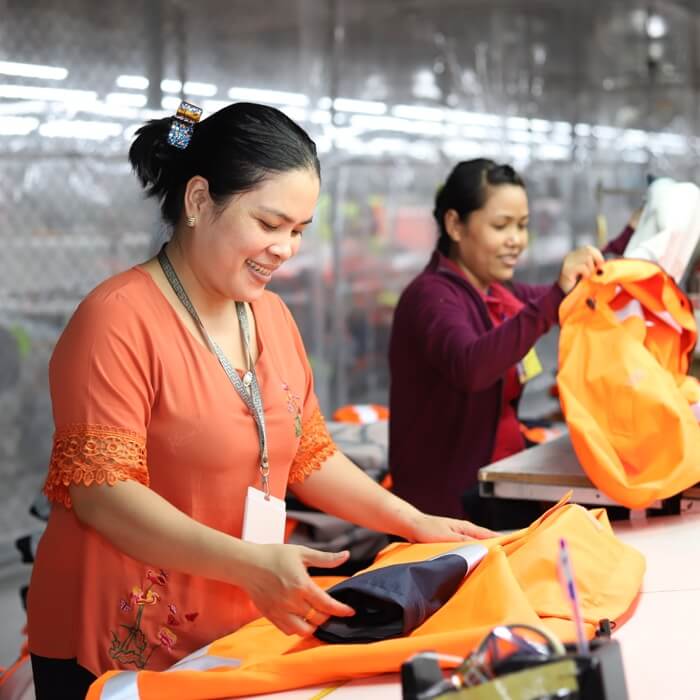Sustainability benefits everyone
As a company, we are proud of the current sustainability initiatives we have in place. We also acknowledge that there is room for improvement. New systems are continually being reviewed to help us reduce our environmental impact, and we have identified the STeP certification by Oeko-tex as a goal to work towards in the future.
We have made the following commitments to ensure our Vietnam manufacturing facility is a sustainable operation:

Waste management
Recyclable waste
Waste is disposed into bins for either recycling or normal waste, the bins are then transported to the rubbish warehouse. Some waste is repurposed beforehand, large fabric off-cuts are used in garments when appropriate, and plastic bags are reused to store small items of stock.
In the warehouse, recyclable waste is further categorised into cans, plastic bottles, glass bottles, cardboard and fabric. This allows the recycling company to operate more efficiently – glass bottles have a different recycling process to plastic bottles for instance. Waste is then collected from the warehouse by certified waste management/recycling companies.
Hazardous waste
Given the nature of our operations, hazardous waste is minimal. It is kept in secure, temporary storage while waiting to be removed by certified waste management companies.

Resource management
Resource management limits unnecessary consumption. This is achieved through the following processes:
Quality management system (QMS)
When mistakes are made, resources are wasted. The goal of a QMS is to increase efficiency, which in turn decreases the waste of resources. Quality control is an integral part of our manufacturing process. Garments are regularly measured and tested during and after production, this ensures that they meet customers’ requirements.
Distribution
Systems are in place to encourage consolidation of shipping. This goes for large shipments of garments, all the way down to posting samples. By delivering more goods together, less carbon emissions are used in transportation.
Supply chain interaction
We encourage sustainability to be a team effort from all parties in the supply chain. Suppliers who can’t meet the expected standards for sustainability are not chosen for procurement. We also help customers limit their environmental impact, working alongside them to find alternative packaging to reduce plastic bags and encouraging the use of recycled plastic if necessary. For some customers we pack 5-10 garments per bag to reduce the use of plastic.
With the growing call for sustainability in the workwear industry, we have been increasing our supplier network with mills that offer recycled fabrics and environmental certifications. This puts us in a strong position to fulfil the growing need for sustainable manufacturing.
Manufactured capital
This refers to all the material resources and energy consumed during the manufacturing process. We have several initiatives to increase the sustainability of manufactured capital.
Rain water is collected and stored in water tanks, which is then reused for the temperature cooling system and bathroom facilities. Lighting has recently been overhauled with more efficient LED lights, and motion lighting has been installed in the bathrooms. Water coolers have been placed around the factory to discourage single use water bottles.
Education
Employees are taught how to act in a sustainable manner. A simple example is printing paper on both sides, or even better, going digital and only printing if necessary. Posters are used throughout the work place to encourage sustainability practices. To save energy, employees turn off the lights during lunch break, this lowers temperatures in the factory, which means less energy is spent on cooling. Employees are also educated about which items can be recycled and how to use the recycling bins.
SMETA audit
SMETA stands for Sedex Members Ethical Trade Audit. With the SMETA audit, customers and stakeholders can be sure that we are operating in an ethical manner. Currently, we have been assessed under the ‘SMETA 2-piller audit’, the elements assessed during this process are:
- Labour standards
- Health and safety
- Management systems
- Entitlement to work
- Subcontracting and homeworking
- Environmental assessment
As a commitment to our social responsibility efforts, we plan to achieve the criteria for the ‘SMETA 4-pillar audit’ by 2020. This audit covers all the aspects previously mentioned, but also features a more complex environmental assessment, and a deeper look at business ethics. This will further enhance transparency of our manufacturing process.
